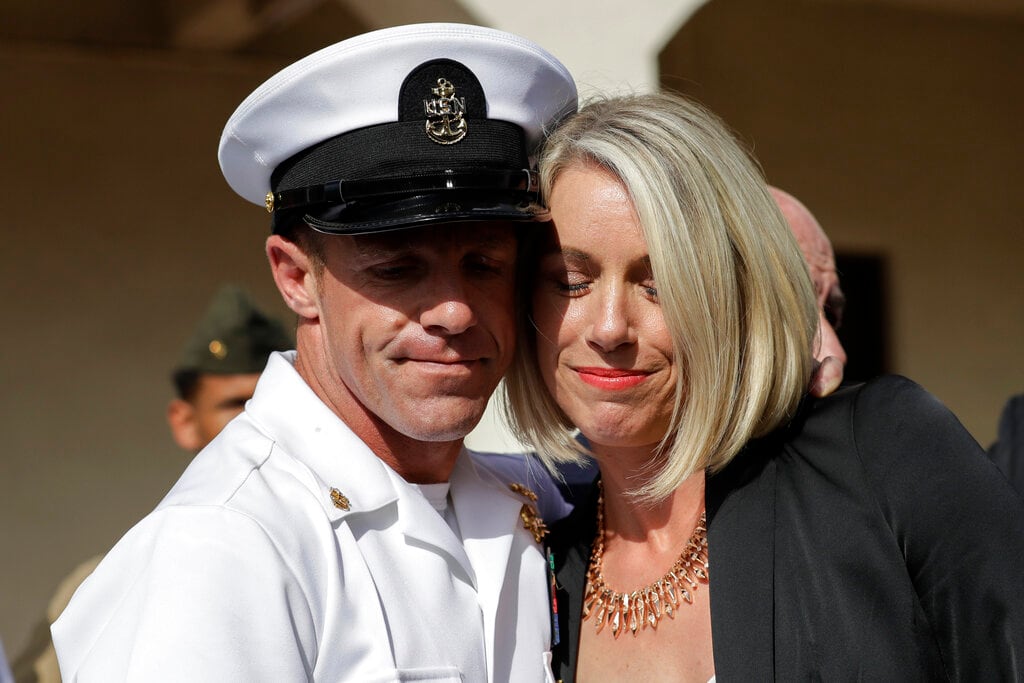Attorneys for retired Navy SEAL Chief Eddie Gallagher filed a lawsuit last week against a New York Times reporter and newly sworn in Navy Secretary Kenneth Braithwaite, alleging that the service unlawfully leaked information and that the reporter defamed Gallagher in news articles.
Filed Friday, the lawsuit alleges that journalist David Philipps “willfully, intentionally, and maliciously published numerous false statements about Chief Gallagher to the public.”
It also alleges that Navy members leaked information about Gallagher’s case protected under the Privacy Act, including “dozens of witness interview summaries and hundreds of seized text messages between Chief Gallagher and other Navy SEALs.”
Citing the ongoing litigation, Navy spokesman Cmdr. Clayton Doss declined comment Monday.
Danielle Rhoades-Ha, a New York Times spokesperson, said in an emailed statement that “Mr. Gallagher’s complaint is long on conspiracy theory and very short on facts about what actually happened in Iraq.”
RELATED

“Dave Philipps did what any good journalist should: he accurately reported on a criminal trial, including testimony that implicated Mr. Gallagher in the death of a man,” Rhoades-Ha said. “Nowhere in a 40-page complaint does Mr. Gallagher deny his role in the killing.”
The lawsuit alleges that Navy officials leaked records to Philipps “to falsely guide the public narrative (and therefore taint the jury pool).”
“Navy officials presented David Philipps with a golden egg,” the lawsuit alleges. “They would illegally provide him with certain protected documents, in clear violation of the Privacy Act and court orders, so that Philipps could write a damning portrayal of Chief Gallagher, with reckless disregard for the truth.”
The lawsuit lists out several examples of Philipps’ reporting that Gallagher’s lawyers say are inaccurate, alleging the reporter manufactured allegations against Gallagher and invented witnesses.
The lawsuit blames Philipps’ “false reporting” for harassment and death threats toward Gallagher and his family.
Friday’s lawsuit seeking unspecified damages is the latest twist in the high-profile Gallagher saga.
Gallagher went to trial last summer on charges that he murdered an Islamic State prisoner of war and committed other war crimes in May 2017 outside Mosul, Iraq.
A military jury only found him guilty of taking a photo with the dead fighter’s body and acquitted him on the other charges.
RELATED

President Donald Trump intervened in the case in November and overturned the jury’s recommended sentence that would have demoted Gallagher to E-6, allowing Gallagher to retire with his anchors and a chief’s pension.
That same month, the head of Naval Special Warfare Command, Rear Adm. Collin Green, attempted to set up a review board to potentially strip Gallagher of his coveted SEAL trident, and Trump tweeted that he would shield Gallagher from such an action.
Then-Navy Secretary Richard Spencer intervened and was accused of saying one thing to the president and another to Defense Secretary Mark Esper about Gallagher’s trident and retirement grade, which led to Spencer’s firing that month.
Gallagher was allowed to retire with his trident.
Geoff is the managing editor of Military Times, but he still loves writing stories. He covered Iraq and Afghanistan extensively and was a reporter at the Chicago Tribune. He welcomes any and all kinds of tips at geoffz@militarytimes.com.




